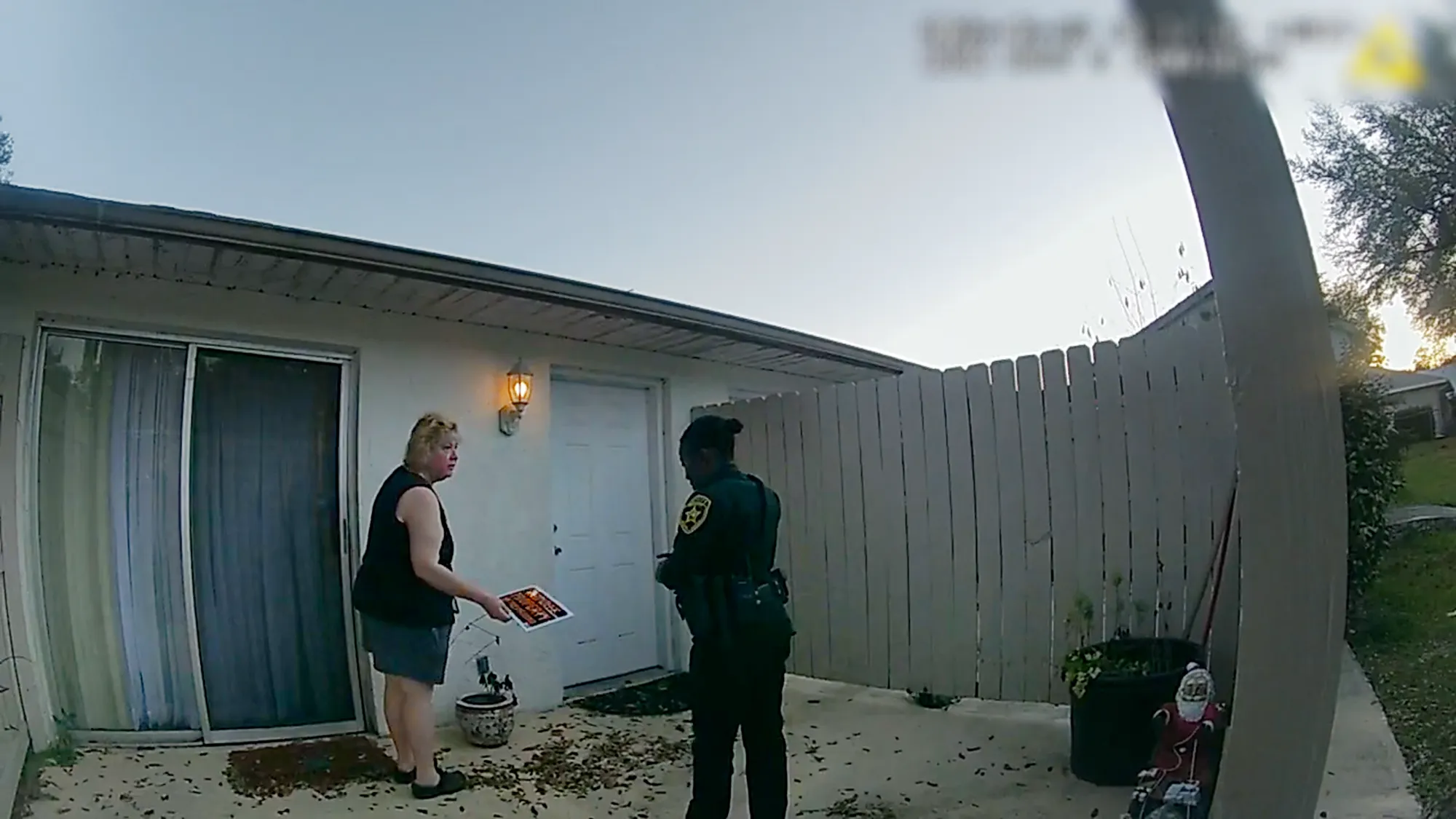In Review: ‘Tron: Ares,’ ‘The Perfect Neighbor’
An all-reviews week begins. The 'Tron' series returns with a movie-approximating audio-visual experience and a groundbreaking documentary uses body-cam footage to get at the truth of a crime.

Because of the abundance of notable new releases this week, The Reveal is making this one of our occasional "Oops! All Reviews" weeks. We're kicking it off with a soon-to-be-released blockbuster and a groundbreaking documentary.
Tron: Ares
Dir. Joachim Rønning
119 min.
Inspired by Pong and the earliest attempts at computer animation, director Steven Lisberger and producer Donald Shaye began imagining the world of Tron in the 1970s, then found imagining it would prove to be easier than selling it. To that end, they created a 30-second proof-of-concept video that included an armored figure throwing discs, a cool bit of animation adopted as the visual component of TV ads for local rock radio stations across the United States. Before the world of Tron inspired a multi-tentacled franchise of films, videogames, and TV series, it functioned as something cool to look at while you thought about music.
Tron: Ares, the third film in the series, essentially brings Tron full circle. As a narrative, it rockets a bunch of flat characters through a dopey, butt-simple story. But as a feature-length music video for the Nine Inch Nails score that plays more or less from Tron: Ares’ first frame to its last (with a memorable break for a Depeche Mode track), it’s incredibly effective, fusing Trent Reznor and Atticus Ross’s music to carefully choreographed action and cutting-edge special effects. Anyone looking for a smart science fiction movie exploring the philosophical implications of artificial intelligence and other concerns should look elsewhere. Anyone in search of a new alternative to Laser Floyd at the planetarium: this one’s for you.
The Reveal is a reader-supported newsletter dedicated to bringing you great essays, reviews and conversation about movies. If you are not paid subscriber, we would love for you to click this button below and join our community.
Appreciating does require overlooking some elements that are usually pretty crucial to enjoying a film, however. Consider this: Much of Tron: Ares concerns the evolution of the film’s title character, who begins as a badass computer program created to do the bidding of evil tech CEO Ed Dillinger (Evan Peters, playing the grandson of the character played by David Warner in the original film and making his own contribution to a 2025 film and TV rogues gallery already filled with villainous Elon Musk surrogates). Summoned into the physical world via a cutting edge 3D printer, Ares begins to grapple with concepts like empathy and compassion, emotions that star Jared Leto has lost the ability to convey (if he ever really had them). The script by Jesse Wigutow (from a story by Wigutow and David DiGilio) freely nods to sources like Frankenstein and Robocop, but when original Tron star Jeff Bridges shows up for what’s effectively a one-scene cameo, the memories he summons of another inspiration, Starman, prove jarring. There’s a sizable gap between a real movie star and someone whose screen presence has ossified into a series of album-cover-ready poses.
Greta Lee co-stars as Eve Kim, the surviving member of a two-sister team that assumed control of ENCOM, the company founded by Jeff Bridges’ Kevin Flynn back in the ‘80s. (A breathless string of news clips fills in what’s happened in the world of ENCOM and its hated rival Dillinger Systems in the years since Tron: Legacy, in case you were worried.) Her loss has led her to redouble her efforts to find the Permanence Code, the long-lost bit of Flynn magic that will allow computer creations to assume physical form for longer than 29 minutes, the point at which they otherwise crumble back into dusty bits and bytes, the Tron equivalent of turning back into pumpkins and mice. (This is a Disney movie, after all.) The good news: she finds it. The bad news: Ed Dillinger sends Ares after her to claim the code as his own.
The best news: None of this really matters if you’re only there to vibe to the music and watch a bunch of amazing images. Director Joachim Rønning (Maleficent: Mistress of Evil, Young Woman the Sea) and his crack special effects team understand both how to create a striking visual and how to cut together an action scene in ways that build a sense of mounting tension rather than chaos. When one of the giant, metallic Recognizers materializes and hovers over the film’s nameless (but Vancouver-ish) metropolis, the camera lingers on the moment, making the device look both solid and threatening in ways alien to similar moments in the Transformers films. Through it all, Reznor and Ross keep the music pulsing in time to the action and for some thrilling, surprisingly long stretches, that’s all the movie needs. Just don’t expect what you see to have any kind of Permanence Code of its own. —Keith Phipps
Tron: Ares materializes in theaters on Thursday night.


The Perfect Neighbor
Dir. Geeta Gandbhir
97 min.
On the evening of June 3rd, 2023 in Ocala, Florida, Ajike “AJ” Owens, a 35-year-old Black single mother of four, was shot and killed by her white neighbor, 58-year-old Susan Lorincz. Owens had been outside Lorincz’s residence to confront her about a particularly nasty exchange between Lorincz and her children, who liked to play in the open lot next to the older woman’s home. That night, local police received two calls in close succession: The first was a trespassing call placed by Lorincz—which we learn was certainly not the only time the authorities had heard from her. The second was a distress call about a shooting at the same address. Lorincz had shot Owens through her front door. After Owens was pronounced dead at the hospital later that night, the killing entered the legal morass of Florida’s “Stand Your Ground” law, which gives generous latitude for citizens to use deadly force to combat the threat of violent crime.
The case was widely covered at the time as a flashpoint for discussion on Stand Your Ground, stoked by protesters in Owens’ sphere who organized quickly after her death and pressured county prosecutors to charge Lorincz for murder. But even given all that the public knows about the incident and its aftermath, nothing can blunt the unique power of The Perfect Neighbor, a groundbreaking and thought-provoking documentary that genuinely advances the form. While anyone with a broadband connection and a social media account has witnessed plenty of footage from smartphones, police body-cams, and CCTV, the sheer abundance of material collected by director Geeta Gandbhir and her editors results in a film without any obvious precedent. It’s not exactly fly-on-the-wall, but it approaches a kind of unmediated truth.
With minimal interstitials and no talking-head material, The Perfect Neighbor unfolds mostly through the digital cameras Ocala police officers wear on their chests. You might immediately wonder how that could be possible, and the answer to that question is Lorincz, who called the cops on her neighbors for trespassing so frequently that they’d been amassing footage since February 2022. The conflict was more or less the same every time: Lorincz did not like the kids making noise in the lot next to her—which, it should be said, she did not own—and there were some ugly exchanges about it, with Lorincz accused of peppering the children with racial epithets. In responding to these calls, the police would try to deescalate tension and gather interviews from all the parties involved, and then the cycle would repeat itself.
In putting all this raw footage together, The Perfect Neighbor winds up with a startlingly cohesive narrative without Gandbhir having to arrange it with too heavy a hand. Two stories emerge at once—one a gripping assemblage of police calls, the other a more insidious tale that Lorincz herself may be constructing to justify an act of deadly violence. The Perfect Neighbor opens up a wealth of discussion points not only on the Stand Your Ground law and racial justice, but on other issues like the murky “transparency” of body-cam surveillance and how best to police a community. It feels like a landmark in digital documentaries, like a shoot nearly finished before a director even came along to make a film out of it. It is shocking in its revelations, thrilling in its possibilities. — Scott Tobias
The Perfect Neighbor opens in select theaters Friday. It premieres on Netflix on October 17th.





Discussion